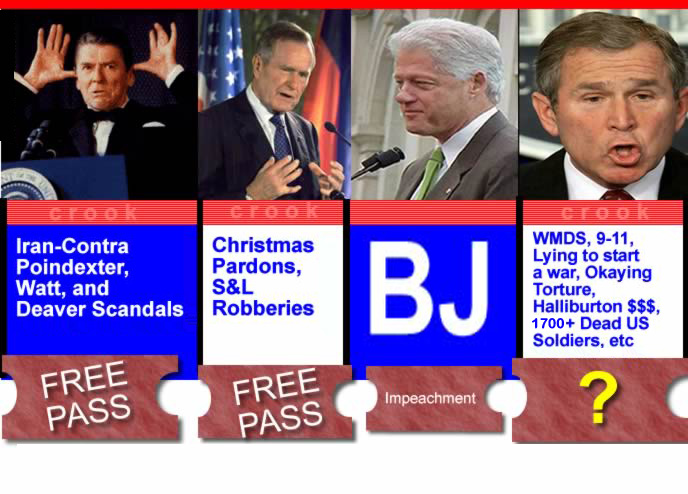NOW THERE IS
A SMOKING GUN!
CAN THE GULLED
RED STATE ZOMBIFIED
DUPES WILLFULLY
IGNORE THIS?

The Secret Downing Street Memo: is the first actual, actionable, impeachable offense with evidence that could stick. Congressman John Conyers has drafted a letter to President Bush asking he answer to the questions raised by the now famous Downing Street memo, which has been trumpeted in every press except here in our America.
To find out about the downing street memo, read it:
SECRET AND STRICTLY
PERSONAL - UK EYES ONLY
DAVID MANNING
From: Matthew Rycroft
Date: 23 July 2002
S 195 /02
cc: Defence Secretary, Foreign Secretary, Attorney-General, Sir Richard Wilson, John Scarlett, Francis Richards, CDS, C, Jonathan Powell, Sally Morgan, Alastair Campbell
IRAQ: PRIME MINISTER'S MEETING, 23 JULY
Copy addressees and you met the Prime Minister on 23 July to discuss Iraq.
This record is extremely sensitive. No further copies should be made. It should be shown only to those with a genuine need to know its contents.
John Scarlett summarised the intelligence and latest JIC assessment. Saddam's regime was tough and based on extreme fear. The only way to overthrow it was likely to be by massive military action. Saddam was worried and expected an attack, probably by air and land, but he was not convinced that it would be immediate or overwhelming. His regime expected their neighbours to line up with the US. Saddam knew that regular army morale was poor. Real support for Saddam among the public was probably narrowly based.
C reported on his recent talks in Washington. There was a perceptible shift in attitude. Military action was now seen as inevitable. Bush wanted to remove Saddam, through military action, justified by the conjunction of terrorism and WMD. But the intelligence and facts were being fixed around the policy. The NSC had no patience with the UN route, and no enthusiasm for publishing material on the Iraqi regime's record. There was little discussion in Washington of the aftermath after military action.
CDS said that military planners would brief CENTCOM on 1-2 August, Rumsfeld on 3 August and Bush on 4 August.
The two broad US options were:
(a) Generated Start. A slow build-up of 250,000 US troops, a short (72 hour) air campaign, then a move up to Baghdad from the south. Lead time of 90 days (30 days preparation plus 60 days deployment to Kuwait).
(b) Running Start. Use forces already in theatre (3 x 6,000), continuous air campaign, initiated by an Iraqi casus belli. Total lead time of 60 days with the air campaign beginning even earlier. A hazardous option.
The US saw the UK (and Kuwait) as essential, with basing in Diego Garcia and Cyprus critical for either option. Turkey and other Gulf states were also important, but less vital. The three main options for UK involvement were:
(i) Basing in Diego Garcia and Cyprus, plus three SF squadrons.
(ii) As above, with maritime and air assets in addition.
(iii) As above, plus a land contribution of up to 40,000, perhaps with a discrete role in Northern Iraq entering from Turkey, tying down two Iraqi divisions.
The Defence Secretary said that the US had already begun "spikes of activity" to put pressure on the regime. No decisions had been taken, but he thought the most likely timing in US minds for military action to begin was January, with the timeline beginning 30 days before the US Congressional elections.
The Foreign Secretary said he would discuss this with Colin Powell this week. It seemed clear that Bush had made up his mind to take military action, even if the timing was not yet decided. But the case was thin. Saddam was not threatening his neighbours, and his WMD capability was less than that of Libya, North Korea or Iran. We should work up a plan for an ultimatum to Saddam to allow back in the UN weapons inspectors. This would also help with the legal justification for the use of force.
The Attorney-General said that the desire for regime change was not a legal base for military action. There were three possible legal bases: self-defence, humanitarian intervention, or UNSC authorisation. The first and second could not be the base in this case. Relying on UNSCR 1205 of three years ago would be difficult. The situation might of course change.
The Prime Minister said that it would make a big difference politically and legally if Saddam refused to allow in the UN inspectors. Regime change and WMD were linked in the sense that it was the regime that was producing the WMD. There were different strategies for dealing with Libya and Iran. If the political context were right, people would support regime change. The two key issues were whether the military plan worked and whether we had the political strategy to give the military plan the space to work.
On the first, CDS said that we did not know yet if the US battleplan was workable. The military were continuing to ask lots of questions.
For instance, what were the consequences, if Saddam used WMD on day one, or if Baghdad did not collapse and urban warfighting began? You said that Saddam could also use his WMD on Kuwait. Or on Israel, added the Defence Secretary.
The Foreign Secretary thought the US would not go ahead with a military plan unless convinced that it was a winning strategy. On this, US and UK interests converged. But on the political strategy, there could be US/UK differences. Despite US resistance, we should explore discreetly the ultimatum. Saddam would continue to play hard-ball with the UN.
John Scarlett assessed that Saddam would allow the inspectors back in only when he thought the threat of military action was real.
The Defence Secretary said that if the Prime Minister wanted UK military involvement, he would need to decide this early. He cautioned that many in the US did not think it worth going down the ultimatum route. It would be important for the Prime Minister to set out the political context to Bush.
Conclusions:
(a) We should work on the assumption that the UK would take part in any military action. But we needed a fuller picture of US planning before we could take any firm decisions. CDS should tell the US military that we were considering a range of options.
(b) The Prime Minister would revert on the question of whether funds could be spent in preparation for this operation.
(c) CDS would send the Prime Minister full details of the proposed military campaign and possible UK contributions by the end of the week.
(d) The Foreign Secretary would send the Prime Minister the background on the UN inspectors, and discreetly work up the ultimatum to Saddam.
He would also send the Prime Minister advice on the positions of countries in the region especially Turkey, and of the key EU member states.
(e) John Scarlett would send the Prime Minister a full intelligence update.
(f) We must not ignore the legal issues: the Attorney-General would consider legal advice with FCO/MOD legal advisers.
(I have written separately to commission this follow-up work.)
MATTHEW RYCROFT
(Rycroft was a Downing Street foreign policy aide)

=====================================
Congressman John Conyers is calling on American citizens to sign on to a letter to the President that demands a response to questions originally posed by Conyers and 88 other members of Congress in a similar letter dated May 5, 2005. Conyers has committed to personally delivering the letter to the White House when it garners 100,000 citizen signatures.
![]()
Let's help him get there. Follow this link to sign.
Over 86,000 signatures so far, as of 12:00 pm, 6-2-05
*The congressman's website is having trouble keeping up with the traffic, and they may also be changing the address of the specific page. The links above will go to the Home page.
The "Downing Street memo", sometimes described as the "smoking gun memo", is a document that contains the minutes taken during a meeting among United Kingdom government and defense and intelligence figures on July 23, 2002 discussing the build-up to the 2003 Iraq War. It was printed in The Sunday Times on May 1, 2005. Its authenticity has been officially confirmed nor by the government, though Downing Street has stated that the document contains "nothing new ." There have been repeated media and congressional requests for clarification.
Ultimately the United Kingdom sent 46,000 troops to join the United States-led action, by far the largest non-US contingent in the invasion.
The memo gets its name from Downing Street in London where the official residence of the Prime Minister of the United Kingdom (at 10 Downing Street) is. It is a metonymy for the United Kingdom government.
Copies of the minutes were sent to:
- Secretary of State for Defence Geoff Hoon,
- Secretary of State for Foreign and Commonwealth Affairs Jack Straw,
- Attorney General of England and Wales Lord Goldsmith,
- Cabinet Secretary Sir Richard Wilson,
- Chairman of the Joint Intelligence Committee John Scarlett,
- Director of the Government Communications Headquarters Francis Richards,
- Chief of the Defence Staff Sir Michael Boyce,
- Head of the Secret Intelligence Service Richard Dearlove,
- Prime Minister's Chief of Staff Jonathan Powell,
- Downing Street Director of Government Relations Sally Morgan, and
- Downing Street Director of Communications and Strategy Alastair Campbell.
Interpretations
Critics of the war claim that the memo proves that the Bush Administration
- was determined to go to war with Iraq prior to considerations of legality,
- and with full knowledge that, at best, "the case was slim",
- selected and exaggerated intelligence so as to confirm their policy and
- developed a plan to manipulate public opinion.
- Also, critics say that the contents (such as "Military action was now seen as inevitable.") and the date of the memo, July 23rd, 2002, contradicts the official White House position that Mr. Bush did not finally decide to carry out the invasion of March 2003 until after Secretary of State Colin L. Powell presented the administration's case to the United Nations Security Council, in a speech on Feb. 5, 2003. They also point out that the memo is dated at a time when Bush stated that "we haven't made any decisions on Iraq, but all options are on the table."
- Another paragraph has been interpreted to show that Geoff Hoon believed timing of the war's start was intended to influence American elections:
- The Defence Secretary said that the US had already begun "spikes of activity" to put pressure on the regime. No decisions had been taken, but he thought the most likely timing in US minds for military action to begin was January, with the timeline beginning 30 days before the US Congressional elections.
It has been said that some of those present at the meeting believed that Iraq might possess weapons of mass destruction (WMD) "capacity". However, the minutes explicitly state that the capability was less than that of Libya, Iran, and North Korea, and that Saddam was not threatening his neighbors.
Reaction
UK Prime Minister Tony Blair
When the document was published, UK Prime Minister Tony Blair denied that anything in the memo demonstrated misconduct and said that it added little to what was already known about how British policy on Iraq developed.
US Congress
On May 5, Congressman John Conyers sent a letter to President Bush signed by 89 of his colleagues demanding an explanation of the revelations in the memo. No specific White House response to the letter has been made publicly. In response to the Bush Administration's refusal to answer the congressional delegation's questions, Conyers et. al have given serious consideration to sending a fact-finding mission to the UK. [1] (http://www.timesonline.co.uk/article/0,,2087-1622378,00.html)
Conyers has requested 100,000 signatures from citizens (a petition) to request that the President Bush answer the questions in his letter. [2]
White House spokesman Scott McClellan
On May 16, presidential spokesman Scott McClellan said that the memo's statement that intelligence was "being fixed" to support a decision to invade Iraq was "flat out wrong." However, McClellan admitted that he has not read the memo, but has only received reports of what it contains. [3]
On May 17, McClellan told reports that the White House saw "no need" to respond to the letter from Congress. [4]
On May 23, McClellan retracted his May 16th statement about intelligence treatment:
- "Let me correct you...let me correct you on the characterization of the quote you attributed to me. I’m referring to some of the allegations that were made referring to a report.
- In terms of the intelligence, the - if anyone wants to know how the intelligence was used by the adminsitration, all they have to do is go back and look at all the public comments over the course of the lead-up to the war in Iraq, and that’s all very public information. Everybody who was there could see how we used that intelligence." [5]
This has jokingly been called "the McClellan challenge". [6]
US Secretary of State Rice and UK Foreign Secretary Straw
On May 18th, 2005, US Secretary of State Condoleeza Rice and UK Foreign Secretary Jack Straw were questioned on the memo, during live coverage of a joint US-UK conference, aired on Sky News:
And if I could, then, ask both of you to comment on the very well-publicised British memo that was leaked ... from the minutes of a meeting that took place in July of 2002 with Tony Blair and some of his military intelligence advisers. In particular, it quotes one British official saying the intelligence and facts that the U.S. was putting forward were being fixed around the policy.... ...could you speak to these allegations, in particular, Madam Secretary, and whether or not this is true? ...Mr. Secretary Straw, if you could also speak to the authenticity of this memo? And in particular, you're quoted in here saying that 'The case was thin, Saddam was not threatening his neighbours, and his WMD capacity was less than that of Libya, North Korea or Iran.'
Neither Rice nor Straw answered the questions. The full transcript is available here
News coverage
The Downing Street Minutes was a major story in the British press during the last few days of the 2005 general election campaign and was also covered in other countries. The story had limited coverage in the USA but has recently gained more attention in the American press.
Some have criticized the American media’s coverage of the memo as disturbingly poor. [7] [8]
On, May 20th, 2005, a new Public Editor for The New York Times, publicly assesed the coverage of the minutes in The New York Times in a forum on the NYT's website. He also stated that, due to continuing reader interest, the paper intends to give fuller coverage to the memo. [9]
On Memorial Day, 2005, the Minneapolis St. Paul Star Tribune was perhaps the first American daily newspaper in a major city to reference the Downing Street Minutes as part of the evidence in an editorial, stating explicitly,
- "President Bush and those around him lied, and the rest of us let them. Harsh? Yes. True? Also yes. Perhaps it happened because Americans, understandably, don't expect untruths from those in power. But that works better as an explanation than as an excuse....
- "It turns out that former counterterrorism chief Richard Clarke and former Treasury Secretary Paul O'Neill were right. Both have been pilloried for writing that by summer 2002 Bush had already decided to invade."
Internet
Numerous web logs have picked up the story (see blogpulse , and a website, www.downingstreetmemo.com, has been created dedicated to informing the public about the memo. [10] is a coalition of more than 90 organizations who support an inquiry by the US into the evidence contained in the Downing Street Minutes, and who are working towards a Resolution of Inquiry into charges of Violation of the Constitution and US law War Crimes violations. On May 30, 2005, in a" blogswarm [11] ) [12] [13] [14] [15] fueled by the memo, hundreds of blogs joined together to form the Big Brass Alliance . The Big Brass Alliance is a collective of progressive bloggers who support After Downing Street, in urging the U.S. Congress to file a formal "Resolution of Inquiry" into President Bush's handling of pre-war intelligence.
Pundits
On May 18, conservative pundit and former Reagan Administration advisor Paul Craig Roberts wrote an article calling for Bush's impeachment for lying to Congress about the case for war.

Citizens
A coalition of citizen groups running the gamut of social and political issues will ask Congress to file a Resolution of Inquiry, the first necessary legal step to determine whether President Bush has committed impeachable offenses. [16] The formal Resolution of Inquiry request was written by Boston constitutional attorney John C. Bonifaz and is available here. The request states the constitutional grounds for impeachment:
- "[The President] has not given [the Senate] full information, but has concealed important intelligence which he ought to have communicated, and by that means induced them to enter into measures injurious to their country, and which they would not have consented to had the true state of things been disclosed to them."
Among the citizen groups are:
- Veterans for Peace
- Progressive Democrats of America (PDA)
- 911Citizens Watch
- Democracy Rising
- Code Pink
- Global Exchange
- Democrats.com
- Velvet Revolution, and
- Gold Star Families for Peace
A website, afterdowningstreet.org (http://www.afterdowningstreet.org/), has been established for the newly emerging citizens' coalition. In the May 31, 2005 Boston Globe, an op-ed by Ralph Nader and Kevin Zeese supports the call for impeachment, citing the memo as part of the evidence that the possibility of deliberate deception by the administration should be investigated.[17]
Democrats.com has raised one thousand dollars, offered as a reward to anyone who can "get George Bush to answer this question:
- "In July 2002, did you and your administration "fix" the intelligence and facts about non-existent Iraqi WMD's and ties to terrorism - which were disputed by U.S. intelligence officials - to sell your decision to invade Iraq to Congress, the American People, and the world - as quoted in the Downing Street Minutes?"
See also
- Declaration of war by the United States
- Governments' pre-war positions on invasion of Iraq
- The UN Security Council and the Iraq war
- Text of Memo
The Downing Street "Memo" is actually a document containing meeting minutes transcribed during the British Prime Minister's meeting on July 23, 2002—a full eight months PRIOR to the invasion of Iraq on March 20, 2003. The Times of London printed the text of this document on Sunday, May 1, 2005, but to date US media coverage has been limited. This site is intended to act as a resource for anyone who wants to understand the facts revealed in this document.
The contents of the memo are shocking. The minutes detail how our government did not believe Iraq was a greater threat than other nations; how intelligence was "fixed" to sell the case for war to the American public; and how the Bush Administration’s public assurances of "war as a last resort" were at odds with their privately stated intentions.
When asked, British officials "did not dispute the document's authenticity." and a senior American official has described it as "absolutely accurate." Yet the Bush administration continues to simultaneously sidestep the issue while attempting to cast doubt on the memo’s authenticity.
Nobody wants to go to war. We trust our leaders to shed blood in our name only when absolutely necessary. But the facts revealed by the Downing Street Memo force us to ask ourselves: Was I misled? Did President Bush tell me the truth when he said he would not take us to war unless absolutely necessary?
More than two years after the start of the Iraq War, Americans are just learning that our government was dead set on invasion, even while it claimed to be pursuing diplomacy. Please join us in demanding that we get to the bottom of this issue.
Quotes regarding the document's validity:This is exciting news. Even as some of the Red State Voters are grasping how much Bush's puppeteers cooked the books and cheated their way into the White House a second time.
"The newly disclosed memo, which was first reported by the Sunday Times of London, hasn't been disavowed by the British government. The British Embassy in Washington did not respond to requests for comment.
A former senior U.S. official called it "an absolutely accurate description of what transpired" during the senior British intelligence officer's visit to Washington. He spoke on condition of anonymity.
A White House official said the administration wouldn't comment on leaked British documents..."
"British officials did not dispute the document's authenticity..."
"Since Smith's report was published May 1, Blair's Downing Street office has not disputed the document's authenticity. Asked about them Wednesday, a Blair spokesman said the report added nothing significant..."
• Indignation Grows in U.S. Over British Prewar Documents,LA Times, May 12, 2005
Links
- Wikisource:Downing Street Memo re Bush's Determination to Topple Saddam
- Wikisource:Letter_from_congress_regarding_Downing_Street_memo
- DowningStreetMemo.com , a site put up by citizens seeking inquiry into memo's evidence.
- AfterDowningStreet.org , a site established for the newly emerging citizens' coalition seeking a formal inquiry into the memo.
- Paul Craig Roberts' article calling for impeachment
- Matthew Clark, csmonitor.com, May 17, 2005, "Why has 'Downing Street memo' story been a 'dud' in US?"
- Newsday - Memo: Bush manipulated Iraq intel [19]
- CNN Report on the memo video
- MSNBC interview of a congresswoman who signed the inquiry letter to Bush (video)
- Iraq: full texts of speeches and key documents archived on The Guardian. Retrieved May 31, 2005.
- DailyKos collection of reports and documents on pre-war intelligence
- Knight-Ridder collection of articles on Iraq intelligence
It's not about blowjobs like “Poppy” got from Jennifer Fitzgerald (and the Press ignored) - it's about lying to the American People and killing young and dedicated soldiers because of an unnecessary mindless rush to war. So ask the next "Reagan Youth" 30-something if he's okay with fellow Americans dying to protect a Russian Pipeline.
o&o - Sparky
















